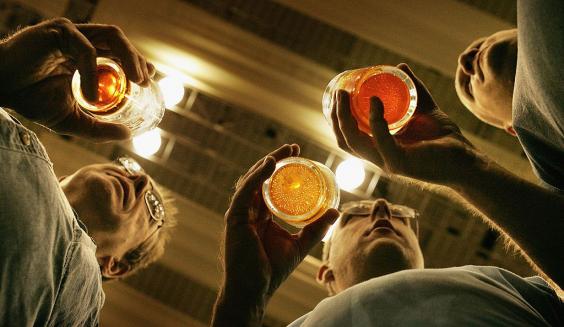Funding Neutrality in Research
"Research shows that industry-sponsored research almost invariably favours the interests of the industry sponsor, even when investigators believe they are immune from such influence."
Marion Nestle, professor, New York University
"[The trial will be immune from industry influence, an unbiased test whether alcohol] in moderation [does protect against heart disease]."
"This study could completely backfire on the alcoholic beverage industry, and they're going to have to live with it."
"The money from the Foundation for the National Institutes of Health [government agency] has no strings attached."
George F. Koob, director, National Institute on Alcohol Abuse and Alcoholism
 |
| The alcohol industry has sponsored many scientists in the field / Getty |
The funding doesn't come from the federal agency, unsurprisingly. Instead five companies representing the world's biggest alcoholic beverage manufacturers -- Anheuser-Busch InBev, Heineken, Diageo, Pernod Ricard and Carlsberg -- pledged $67.7 million toward a foundation raising money for the NIH agency, and the National Institute on Alcohol Abuse and Alcoholism is prepared to supervise and oversee the study.
The plan is to recruit roughly eight thousand volunteers at 15 sites worldwide, age 50 or over at medical centers in the United States, Europe, Africa and South America where randomly-assigned participants agree to stop using alcohol altogether, or to consume a single alcoholic drink of their preference each day. They will be followed for six years to determine which group; moderate drinkers or abstainers, suffers more heart attacks, strokes and death.

The claim that moderate drinking is better than abstinence has never been fully investigated (Getty)
Volunteers will not be aware in advance which group they will be assigned to, and study organizers feel this could represent a stumbling block in recruiting volunteers. Harvard University where the clinical trial will be directed from, has itself a long historical link with the beverage industry. The Foundation for Advancing Alcohol Responsibility, founded by distillers, gifted Harvard $3.3-million in 2015 to fund the establishment of an endowed professorship in psychiatry and behavioral science.
In 2005, Harvard's School of Public Health attracted scrutiny when one of its professors promoted the health benefits of beer in partnership with Anheuser-Busch and Anheuser was moved then to donate $150,000 for doctoral students' scholarships. Moreover, Dr. Koob, assurances aside, himself served on the medical advisory council of the Alcoholic Beverage Medical Research Foundation from 1999 to 2003, (before it underwent a name change to the Foundation for Alcohol Research), the industry group that provided him with research grants of up to $40,000 yearly between 1990 and 1994.
Many other researchers who will be involved in the study also have either personal or through an institution, financial links to alcohol industry funding. Harvard associate professor of medicine, Dr. Kenneth J. Mukamal, identified as principal investigator of the study has stated never having received funding from the industry. "We have had literally no contact with anyone in the alcohol industry in the planning of this [research]", he pledged.
The hypothesis that moderate alcohol consumption is a positive for human health dates back one hundred years. A Johns-Hopkins scientist published a graph back then that appeared to demonstrate modest drinkers lived longer than heavy drinkers, and abstainers as well. On the other hand, critics of this received wisdom make the interpretation that healthy people are given to moderate drinking, not that doing so helps to make people healthy.
"People will react differently if [disseminated results of the study] it says the study is 'sponsored by N.I.H.' or 'sponsored by Anheuser-Busch'," pointed out Art Caplan, director of medical ethics at the N.Y.U. School of Medicine; adding that the role of the industry would best be disclosed on dissemination to the public of the study's findings.
 |
| Cultura RM Exclusive/Liam Norris/Getty Images |

0 Comments:
Post a Comment
<< Home